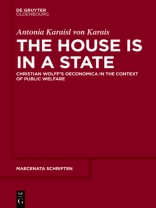The book focuses on methodology, argument and context of 18th century philosopher Christian Wolff’s last book, the Oeconomica. This work, a rationalist guide to household morality, is discussed in conjunction with Wolff’s natural law-based welfare state theory. A case study at a cross-section of philosophy, political science and history, it dissects the ideological conflation of private and public interest in the absolutist state.
Inhaltsverzeichnis
Table of Contents
Chapter 1
1. Introduction
1.1. The reception of Wolffian philosophy
1.2. Wolff’s Oeconomica in the literary context
1.3. Research question and methodology
Chapter 2
2. The hallmarks of Wolffian philosophy
2.1. Introduction
2.2. Wolff’s scientific method
2.2.1. Wolff’s method in context
2.2.2. Demonstrative morality
2.3. Wolff’s philosophical system
2.3.1. The concept of system in context
2.3.2. Wolff’s system in practice
2.4. Wolff’s natural law
2.4.1. Wolffian natural law in the historical context
2.4.2. Natural law as a theoretical foundation for moral philosophy
Chapter 3
3. A contextual reading of the Oeconomica methodo scientifica petractata
3.1. Introduction
3.2. Oeconomica – methodo scientifica pertractata
3.2.1. Truth, non-contradiction and household wisdom
3.2.2. A house built on sufficient reasons
3.2.3. Sources of knowledge in the Oeconomica – empirical, rational, practical
3.3. Oeconomica in the philosophical system
3.3.1. Crosspollination in the systema doctrinarum
3.3.2. The household as a structural liability
3.4. Natural law in the Oeconomica
3.4.1. A contractual reading of family life
3.4.2. Reconciling reason and religion
3.4.3. Natural law beyond the home turf
3.5. Summary
Chapter 4
4. Oeconomica, natural law and social welfare in the absolutist state
4.1. Introduction
4.2. The theoretical foundation of social welfare in Wolff’s natural law
4.2.1. The contract as a legitimising fiction
4.2.2. Patrimonial welfare: moral duty with an ulterior motive
4.3. State education in philosophy and reality
4.3.1. Non scholae sed vitae – pedagogy in education
4.3.2. Universities: theory in practice
4.4. Preserving prosperity, providing for the poor
4.4.1. Economic sustainability in the household
4.4.2. The case for state-managed poor relief
4.5. Public Health
4.5.1. Keeping the healthy healthy
4.5.2. A priori medicine contra institutional innovation
4.6. Summary
Chapter 5
5. Michael Hanov’s completion of the Wolffian system
5.1. Introduction
5.2. Hanov: From independent scholar to wavering Wolffian
5.2.1. Hanov’s intellectual background
5.2.2. Congruences and dissonances between Hanov and Wolff
5.3. Hanov’s Oeconomica – method, system, natural law
5.3.1. Method
5.3.2. System
5.3.3. Natural Law
5.4. Hanov versus Wolff – political systems in comparison
5.4.1. Legitimacy, power and levels of administration
5.4.2. Social welfare programmes in contrast
5.5. Summary
Chapter 6
6. Conclusion
Bibliography
Über den Autor
Antonia Karaisl von Karais, Warburg Institute, University of London (UK)












